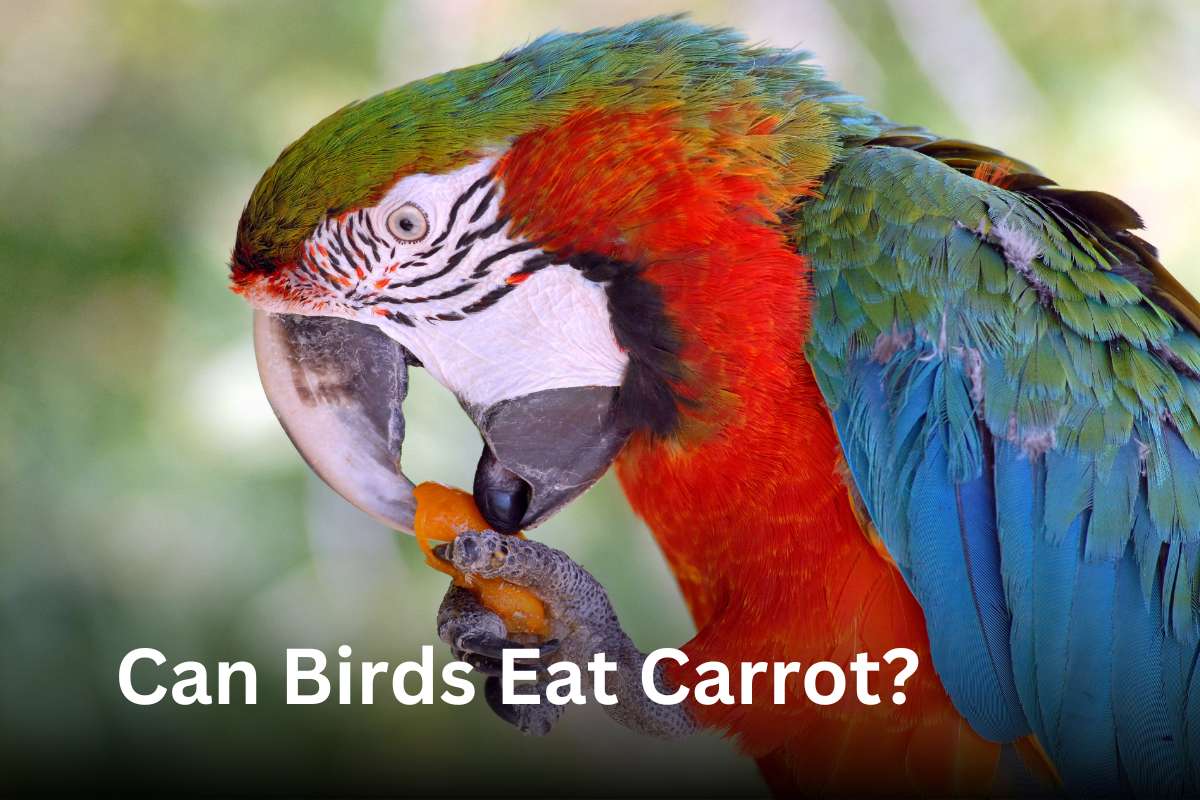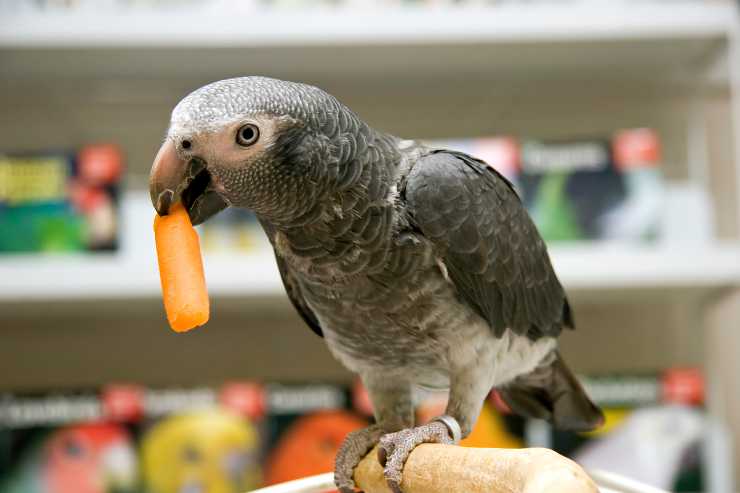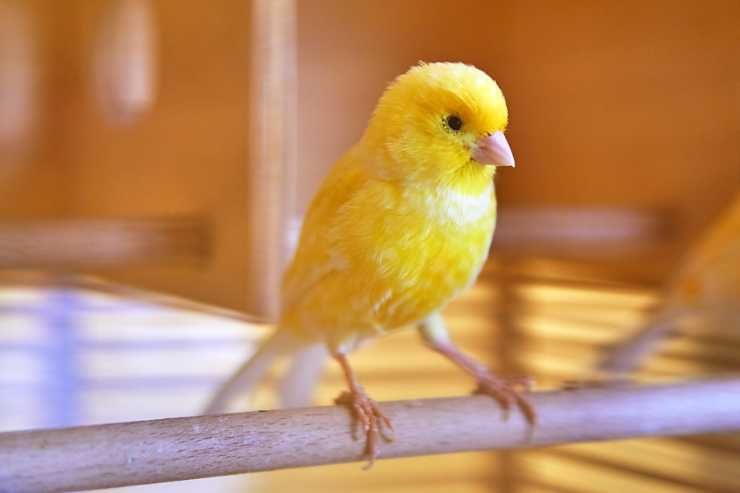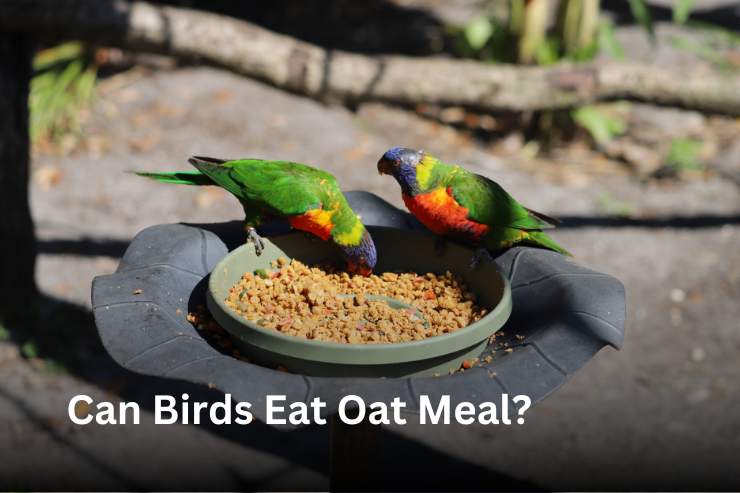can birds eat carrot?

Birds are fascinating creatures with complex dietary requirements, and as bird enthusiasts, we frequently question which human foods are acceptable for them.
One such question is whether birds can consume carrots. The answer is yes, and birds can eat carrots and benefit from them in a variety of ways.

In this article, we’ll look at why carrots are excellent for birds, how to prepare them, and some things to keep in mind.
Nutritional Benefits of Carrots for Birds
Carrots are a vitamin and mineral-rich vegetable that birds can benefit from. Here are some critical elements found in carrots and their benefits:
Vitamin A: Carrots are rich in beta-carotene, which the body turns into vitamin A.
This vitamin is essential for keeping good vision, skin, and immune function. Vitamin A is very critical to birds’ respiratory health and overall vitality.
Vitamin C: While not all birds require vitamin C in their diets, some species benefit from its antioxidant properties, which aid in the fight against free radicals and improve the immune system.

Fiber: Carrots include dietary fibre, which improves digestion. It provides fibre, which can help birds keep a healthy digestive tract.
Potassium: This mineral is necessary for healthy muscle function and fluid balance in birds.
Antioxidants: Carrots include a variety of antioxidants that assist in reducing inflammation and promote general health.
Types of Birds That Can Eat Carrots
Carrots are safe for most birds, including pets and wild birds. Here are some instances.
Parrots: Carrots such as budgies, cockatiels, and macaws are popular among parrots. They gain from the nutrients and like the crisp texture.
Canaries: These little birds may also consume carrots. They prefer carrots that have been grated or coarsely minced.

Wild birds: Many wild birds, including robins, sparrows, and finches, are adaptable and will eat carrots if placed in a bird feeder or dispersed over your yard.
This knowledge empowers you to provide a varied and nutritious diet for your feathered visitors.
How to Prepare Carrots for Birds
Proper preparation ensures that birds can safely and easily eat carrots. Here are some ways to cook carrots for birds.
Raw Carrots:
Raw carrots can be given to birds in various ways. Larger birds can consume entire baby carrots, but smaller birds may benefit from shredded or finely chopped carrots.
Ensure you thoroughly wash the carrots to eliminate any chemicals and litter.
Cooked Carrots:
Cooking carrots softens them and makes them simpler to eat for birds, particularly smaller birds or those with weaker beaks.
Steam or boil the carrots until cooked, then allow them to cool before serving to your feathered companions. Avoid adding seasonings or oils.
Carrot Tops:
The green tops of carrots are tasty and nourishing for birds. Wash them carefully and cut them into little pieces to give your birds.
Carrot Juice:
Small quantities of freshly produced carrot juice can be offered to birds. Ensure that there are no added sugars or preservatives.
How to Serve Carrots to Birds
Sometimes, carrots can be offered as a reward in addition to their regular diet. Serve in minimal quantities to prevent overeating.
Mixed with other foods. As a responsible bird owner, you can provide a nutritious and varied diet for your birds by combining grated or chopped carrots with other fruits and vegetables.
Small carrot pieces can be placed in bird feeders or scattered throughout your garden to attract wild birds. This can attract a wide range of bird species.
This is a simple yet effective way to ensure your birds’ health and well-being.
Safety Considerations
While carrots are typically safe for birds, there are a few things to keep in mind.
Pesticides: Make sure the carrots you sell are organic or carefully washed to remove any pesticide residues that could damage birds.
Portions size: Serve carrots in moderation. Too much of any one food can result in an imbalanced diet. Carrots should be part of a well-balanced diet that includes seeds, grains, fruits and vegetables.
Freshness: It’s crucial always to serve fresh carrots. This not only ensures the nutritional value but also reflects your responsibility as a bird owner. Remember to remove any uneaten parts promptly to avoid spoiling and potential health risks.
Signs of Overconsumption
Keep an eye out for warning signs of overconsumption or dietary imbalance among your birds. These indications may include:
- Unusual variations in the colour, consistency, or frequency of droppings may suggest a nutritional problem.
- Significant weight gain or loss may indicate that their diet needs to change.
- Changes in energy levels, feather conditions, or overall behavior can be attributed to nutritional issues.
Conclusion
To summarize, carrots can be a nutritious and delightful addition to a bird’s diet.
They provide critical nutrients such as vitamins A and C, antioxidants and fibre, which can benefit a bird’s overall health.
By properly cooking and serving carrots in moderation, you can provide a nutritious treat that your feathery companions will enjoy. Ensure that birds’ diets are constantly fresh, clean, and balanced to keep them happy and healthy.
So go ahead and share some carrots with your avian friends, and watch them enjoy this crunchy treat!
Frequently Asked Question
Are birds allergic to carrots?
Birds rarely develop allergic reactions to carrots. Carrots are generally safe for most birds to eat. Different birds, on the other hand, may have individual sensitivities, so it is critical to introduce new foods gradually.
What vegetables are safe for birds?
Bird-safe veggies include carrots, spinach, broccoli, bell peppers, green beans, peas, zucchini, cucumbers, kale, sweet potatoes, butternut squash, Brussels sprouts, cauliflower, celery, and leafy greens.






